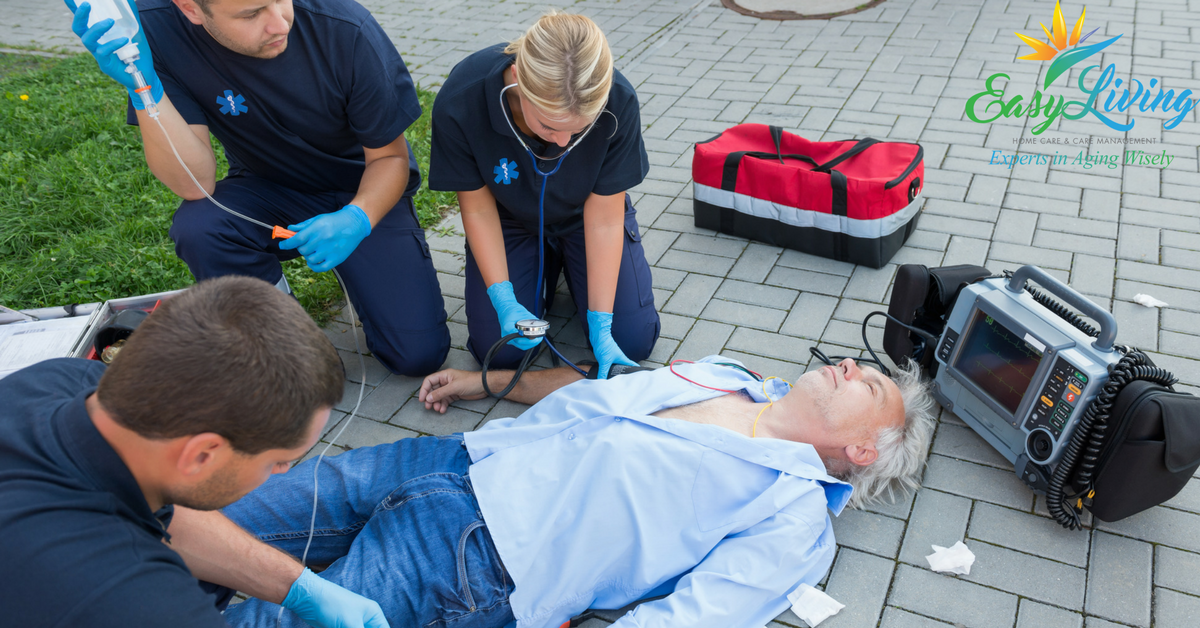Our Family Crisis: Mom Could’ve Died
Last week was awful. I was so scared Mom was going to die. She fell in her kitchen and was on the floor for an entire day. When we couldn’t reach Mom, we finally called a neighbor to go check on her. It could’ve been even longer if we hadn’t had a call scheduled. Her neighbors keep an eye out for her, but they can’t check in all the time and they don’t like to “bother her”.
Just imagine…24 hours on the cold, hard floor. She’s diabetic and requires several medications so she was in bad shape. The hospital is stabilizing her blood sugar and monitoring her, but it looks like she’ll pull through. We were lucky this time, though it looks like she will need to go to rehab for some time to be able to walk on her own.
Your Worst Fears Realized
Unfortunately, many families face similar scenarios. My own grandmother got stuck in her bathtub for almost 30 hours. She also survived, but she needed help from that point forward. So often, the very desire to stay completely “independent” results in the opposite. I remember how Grandma had brushed off our suggestions for an emergency response system. She thought her cordless phone was good enough, but it doesn’t help much when it’s out of reach. Since we didn’t live nearby or visit daily, the situation could’ve been deadly.
We get many calls from families in crisis. Sometimes it’s an incident of CHF (cardiac heart failure), problems with blood sugar, dehydration, or confusion/wandering (due to dementia, infections or medication mixups). More often than not the person has fallen. You call and don’t get a response. Or you get a dreaded call…from 911, the hospital or a neighbor.
What Happens Next: Crisis Management
The whole situation is scary. You’re thrown into crisis mode, figuring out what’s happening and what’s next. Whether you’re dealing with it from afar or navigating an unfamiliar medical system, you suddenly have a lot on your hands (and mind). In the cases above, the elders were eventually able to return home. But, both needed help to do so. Many times, the results are much worse.
If you find yourself facing something like this, call our care management team immediately (727-447-5845) for advocacy help and planning. You’ll need to make some decisions about aftercare, whether in rehab or at home. And, you’ll need to put plans in place to keep your loved one safe moving forward. Whether it’s already happened or you worry it might, our team will share some practical advice and resources for your peace of mind.
How To Prevent the Crisis
Get an emergency response system NOW.
Any person with health issues should have one…not just someone over 80. It’s a security measure if you live alone as well. You have responders at the touch of a button. It can also prevent panic–avoid unnecessary calls to 911 and the trauma of having firemen break down the door. Some systems can provide a daily phone check in with the customer too.
Consider employing more sophisticated home tech options.
A Nest camera or system like Alexa Show can help you see what’s going on in the home, which tells you a bit more than a call. Electronic pillboxes help with medication safety and some can alert you that something’s awry. Medical monitoring provides an early warning system for specific medical conditions. For example, in-home heart monitors can send results to caregivers/doctors. Some emergency response systems have expanded to detect falls. In-home sensors can pick up on unusual behavior patterns.
Hire a caregiver for in-person check-ins.
As our examples show, phone calls aren’t sufficient. And, home technology tends to be specific and not as preventative in nature. Don’t count on neighbors. They’re often busy and may not want to meddle too much. Plus, they’re not trained to know what to look for.
A caregiver can help with medications, nutrition, hygiene, and safety. While there, they serve as a trained set of “eyes and ears”. The home care plan will include monitoring your loved one’s general well-being as well as signs specific to their condition. Even a weekly visit by a trained caregiver greatly reduces risk. Besides spotting issues, your loved one will stay healthier with better care.
Assess the situation and gather resources.
Meet with a care manager before a crisis. Your care manager will suggest preventative measures and help find acceptable solutions for your loved one. We know it’s likely they’ve politely (or not so politely) turned down your suggestions. You’ll be relieved at the results. And, you’ll have a local resource to turn to for any problems that arise. Facing a crisis is better when you have someone familiar to call who knows the system. There’s nothing worse than scrambling for help when you’re worried your loved one might not make it through the night.

